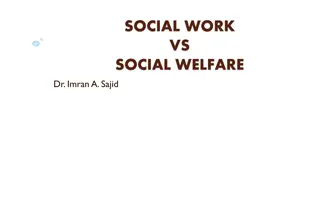Evolution of Capitalism and Welfare Development
Earnest Mandel identified three types of capitalism - industrial, entrepreneurial, and corporate - each influencing welfare development differently. Industrial capitalism lacked state welfare, while entrepreneurial capitalism introduced social security measures. Corporate capitalism necessitated state intervention to support individuals through social insurance and security. The evolution of capitalism has shaped social policies related to healthcare, housing, and employment security.
Download Presentation

Please find below an Image/Link to download the presentation.
The content on the website is provided AS IS for your information and personal use only. It may not be sold, licensed, or shared on other websites without obtaining consent from the author. Download presentation by click this link. If you encounter any issues during the download, it is possible that the publisher has removed the file from their server.
E N D
Presentation Transcript
The Capitalist State and Welfare Development
Capital a resource or resources that can be used to generate economic wealth Capitalism an economic system characterized by private or corporate ownership of capital goods. Resource: a source of supply or support
Earnest Mandel He has identified several versions of capitalism and the resultant impacts on the nature of welfare development. [1]: [1] E. Mandel,1968.Marxist Economic Theory. London : Merlin.p.23.43.
He identified three types or stages of capitalism namely (1) industrial capitalism, (2) entrepreneurial capitalism, and (3) corporate capitalism and their roles in welfare development as below;-
(1) the industrial capitalism Industrial capitalism refers to an economic and social system in which trade, industry and capital are privately controlled and operated for a profit. During the industrial capitalism there was no state welfare at all and wherever it existed, it arose from the need to bolster an economy. Sanitation and housing policies were developed to ensure the existence of a healthy working population housed in the proximity of industrial work places. Industrial Capitalism No Welfare
(2) Entrepreneurial Capitalism 19th century was marked by entrepreneurial capitalism, which is, private capital, investing in private start-ups, with potential for a viable harvest. Entrepreneurial capitalism provides social security measures so that new entrepreneurs can take risk of starting up new businesses. Social security, child care, food stamps, publicly funded insurance lowers the risk of starting a business Entrepreneur: risk-taking businessperson Entrepreneurial Capitalism: Risk Coverage
(3) Corporate Capitalism Corporations perforce the state to aid the individuals. The capital intensive operations of large corporations require a stability of consumption of their products: corporate capitalism respond rather more slowly to the state intervention and provides system of social insurance, social security and unemployment benefit. The workers whose earnings have been interrupted can,, therefore, continue to consume. [1] [1] Michael Sullivan, 1990. Op.Cit. P.83. Corporation: a company recognized by law as a single body with its own powers and liabilities, separate from those of the individual members. Corporate Capitalism: Improving people s capacity to buy and consume
Moreover, corporate capitalisms drive to increase productivity, consumption and therefore, profit, leads to the introduction of policies for mass health and educational services so that the productivity and productive life of the worker might be increased.
This means state intervention in welfare arises from the requirements of capitalism. According to Powell, it marks neither the end of capitalism[2] nor its transformation rather it strengthens the power and wealth of the powerful and wealthy and mark but a new phase in capitalist development[3]. [2] J.E. Powell, 1969. Freedom and Reality. London: Elliot Right way Books.p.34. [3] C.A.R.Crosland, 1952. The Transition from capitalism in R.H.S. Crossman, 1952 (ed) New Fabian Essays. London: Turnstile Press. p. 56.
SUMMARY: CAPITALIST THEORY OF WELFARE S# Stage of Capitalism Characteristics Nature of welfare 1 Industrial Capitalism trade, industry and capital are privately controlled and operated for a profit. No welfare by the state; Sanitation and housing in proximity to industry 2 Entrepreneurial Capitalism private capital, investing in private start-ups, with potential for a viable harvest. Trade, industry and capital owned by large scale corporations Risk Coverage; Social Security, Social Insurance, Child Care, Food Stamp etc 3 Corporate Capitalism Improving people s capacity to buy and consume; Social Insurance, Social Security, Unemployment Benefits, Mass Health, Mass Education






























